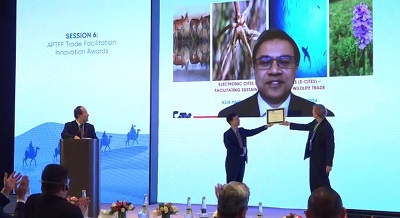Samarkand, (Samajweekly) The processing of paper-based trade documentation, such as permits and certificates, can lead to issues such as an increased risk of fraud, the time-consuming processing of manual permits, a lack of access to trade and transaction information, and poor data sharing between the parties involved in the clearance process.
These issues are exacerbated for those seeking to trade internationally species regulated by the Convention on International Trade in Endangered Species of Wild Fauna and Flora (CITES), as additional information is required to ensure the trade is legal and sustainable.
In response to these challenges, the CITES Secretariat on Saturday said it has developed a comprehensive set of tools for electronic CITES permitting systems, or eCITES, that support the global greening of trade processes.
On April 2, the CITES Secretariat received the Asia-Pacific Trade Facilitation Forum (APTFF) 2024 Trade Facilitation Innovation Award in recognition of the Convention’s electronic permitting systems (eCITES).
The prestigious APTFF Trade Facilitation Innovation Awards bestow recognition to innovative national or subregional trade facilitation cases reflecting the annual theme.
CITES Secretary-General Ivonne Higuero expressed her appreciation to the organisers and said: “The CITES Secretariat is honoured to accept this distinguished award. This global recognition brings awareness to the necessity and utility of a key digital innovation in the international wildlife trade, which I hope will inspire wider eCITES implementation among our parties.”
Electronic CITES Permitting Systems (eCITES) have catalysed a novel set of collaborative efforts for enhancing trace facilitation and leveraging digitalisation for legal, sustainable, and traceable international wildlife trade.
To date, 31 Parties have made considerable strides in implementing eCITES, with an additional 12 Parties in the initial planning phases. Their dedicated efforts have significantly bolstered transparency, curtailed the exploitation of counterfeit permits, facilitated smoother cross-border transactions, and fortified international collaboration.
In its submission, the secretariat highlighted the comprehensive set of standards, tools and guidance for eCITES implementation and their benefits to the Parties. It further elaborated how eCITES has contributed to the United Nations Sustainable Development Goals (SDGs) –namely, SDG 13 (Climate Action), SDG 14 (Life Below Water), SDG15 (Life on Land) and SDG17 (Partnerships for the Goals) — by increasing access to reliable wildlife data, improving the sustainability, legality and traceability of wildlife trade, and improving economic opportunities for indigenous peoples and local communities involved in trade.
In accepting the award, CITES Secretariat Programme Officer and eCITES Focal Point Salehin Khan highlighted the contributions of the partners in developing eCITES making it a valuable source of framework for implementing permitting systems based on international standards and best practices.
In particular, he pointed out the support provided by Switzerland in advancing eCITES among the CITES Parties, as well as to the United Nations Conference on Trade and Development Automated System for Customs Data for jointly developing an off-the-shelf digital eCITES solution.








